#best value auto parts
Explore tagged Tumblr posts
Text
Shop the Best Centric Premium High Carbon Brake Rotor by Stoptech. Free Shipping. Great Prices and a Large Selection at RV and Auto Parts.
#best value auto parts#best online auto parts#best value auto body supply parts#best online auto parts store#buy rv parts online
0 notes
Text
Best value auto parts
Maintaining and repairing vehicles is an essential aspect of vehicle ownership. When it comes to purchasing auto parts, striking the right balance between quality and affordability is crucial. Searching for the best value auto parts ensures that your vehicle operates at its peak performance while staying within your budget. In this article, we will explore some key factors to consider when seeking the best value auto parts for your beloved ride. While affordability is a significant factor, it's essential not to compromise on the quality of best value auto parts. High-quality parts ensure the safety and efficiency of your vehicle, reducing the risk of breakdowns and costly repairs in the future. Opt for reputable brands and suppliers known for their reliable and durable auto parts, even if it means paying a slightly higher price upfront. Investing in quality now will save you money and headaches in the long run. When searching for auto parts, ensure they are compatible with your specific vehicle's make and model. Using ill-fitting or incorrect best value auto partscan lead to performance issues and safety concerns. Look for online resources, such as vehicle compatibility checkers, or consult with experts at auto parts stores to confirm the right fitment for your car. Reputable best value auto parts suppliers often offer warranties on their products. A warranty provides peace of mind, assuring you that the part is free from defects and will function as expected. Additionally, a reliable return policy allows you to exchange or return the part in case it doesn't meet your requirements. Prioritize suppliers that stand behind their products with robust warranty and return policies. Before making a purchase, take the time to read customer reviews and ratings for the best value auto parts you are considering. Genuine feedback from other vehicle owners can provide valuable insights into the performance, durability, and value of the product. Look for parts with consistently positive reviews and high ratings to ensure you are getting the best value for your money. To further enhance the value of your best value auto parts purchase, keep an eye out for discounts, promotions, and special offers. Many suppliers offer periodic sales or discounts, especially during seasonal promotions. Signing up for newsletters or following social media accounts of auto parts stores can help you stay informed about these opportunities to save. When it comes to finding the best value auto parts, a balanced approach is key. Prioritize quality, compatibility, and reputable suppliers over the lowest price. Remember to consider warranties, return policies, customer reviews, and any available discounts. By investing in high-quality, compatible auto parts, you ensure the longevity and optimal performance of your vehicle, ultimately saving you time, money, and potential headaches in the long run. Happy driving!
1 note
·
View note
Text
The Fear of being Censored Or Unaccepted
Today's post is something I'm so touched about. This topic is something so close to me as a writer, as a reader, and a Queer myself, I am a proud member of the LGBTQIA+ community and I am standing tall in front of everyone. I spent so many years fearing this part of myself because of the judgment of people, I lost my last job for it, but I do not care, because I think if someone judges a human being only based on who they are sleeping with, then I prefer to be a home mom, than break my back for someone who doesn't value my capabilities as an accountant, a proofreader, Translator or the Graphic Designer I sweat seven shirts to be. I know my value and I won't bow again in front of someone else lying to myself just because some people do not like it, family, bosses, or anything else.
Said that I am working with other marvelous people on a writing project as you saw in my other profile @reginakoilos, and some days ago we had a conversation about censorship. It scares the hell off many people, and it worries a lot of people, but I think that this is still a free World, we have rights, we have creativity and NOBODY can tell us what to write about.

Sadly I've passed this before and I've learned that the only way to avoid it and fight it is to stand tall and not bow.
If I can I will give you some pieces of advice right here:
Don't lose yourself: The first rule is to be loyal to yourselves, if you want to write about LGBTQIA+, Hetero, or Whatever you want to write about Just Do It! Nobody can say to you what to or what not to write. But always remember To Be Respectful.
Auto-Publish: This method of publishing will be your best friend, at least at the start. You will be able to gain money writing what you love, as you love, and Because you love. You won't need a Publisher at the beginning. Besides Internet is way too Vast to censor each and every "uncommon" content!
Marketing: This is the rule of the rules, advertising your product will help you gain public and start your little niche of readers.
Stay away from people who ask you to write only about "common" couples: Nobody has to ask you that, NEVER, because creativity is something subjective and doesn't need to be stopped by those requests. Most of all because with that people can start to feel a bit uneasy and unaccepted.
Never accept compromises regarding the sexuality of your characters: I don't know how you see that, but I honestly consider my characters as a little piece of my mind and they are fruits of hard work and deep thoughts and you must be strong enough to fight for what YOU created with a lot of effort and patience.
Whatever comment will come your way, remember: Only constructive Criticism must be taken into consideration, all the rest is trash and must be something not to consider.

Another topic I came across during this past week, is the horrendous practice of Shaming others, for their diversity, and their way of choosing Characters and making them appear in some way instead of another. I mean, we are in 2025, how can it be possible to read comments of hate like that? 1. Every character is a creation of the writer and the latter has ALL and EVERY right to make the OC however they decide.
2. Why get so mad if someone writes about a chubby character instead of a skinny one? Cannot it have the same appreciation? Every character has its own sexuality, physique, strength, and flaws, they are all different!
3. Every person around here has the right to speak their own mind, of course, but the rule must be always the same RESPECT, something that is missing apparently during this last period.
I really hope next time or if it happens for the first time, you will be strong enough to send back those comments to the sender, because NOBODY has the right to tell you how to write or what.
I speak for myself, I can give advice, but all is up to you.

#writing#creative writing#writers#on writing#writing advice#writing life#writerscommunity#writers on tumblr#lgbtqia+
20 notes
·
View notes
Note
regarding pokemon sleep, it looks like you’re just looking for things to complain about. it’s designed to be this chill thing you check on during the day and leave running at night. to play it, all you have to do is sleep and feed your pokemon. no one’s telling you you to have to be the very best at it or pressuring you into paying for stuff, let alone the game itself.
If I was just looking for things to complain about, I'd still be out here whinging over Pokemon Cafe's delightfully charming art style being absolutely wasted on a junk puzzle game instead of a full RPG or cozy slice-of-life Sim.
Regarding this post here.
Hi, I'm MerriAuthor. Apparently we haven't met because anyone who follows my blog would know that I've worked in game development well on 20 years now. I've worked across the industry from little nobody indie houses, to overseas gacha-fodder, to big ol' AAA major studios. Video games and their design are a big part of my life and, boy howdy, do I have some FEELINGS about the direction the industry as a whole has gone in as the years go by. Especially in regards to the predatory monetization of gaming and how it actively preys on children, uninformed parents, people with addictive behaviors, people with hyper-competitive personalities, and similar behavioral traits solely for the purpose of making money at their expense.
it’s designed to be this chill thing you check on during the day and leave running at night. to play it, all you have to do is sleep and feed your pokemon.
As with the previous person I spoke with on this topic, that is the base function of the game. But it's by no means the design of the game. Pokemon Sleep's entire game play rotation and marketplace are designed around encouraging the Player to interact with it as much as possible within an intentionally limited time frame. Meanwhile, the game's own time scale is such that it expects Players to log hundreds if not thousands of hours of interaction with it. Its own base gameplay loop is a weekly schedule and its shop schedule is monthly. Some Pokemon require a bare minimum of 150 hours of logged sleep to even access. Pokemon Sleep wants you to be in it for the long haul.
It's also based on collection; nearly every facet of the game is listed numerically and with a percentage value or progress bar, which are functions designed to produce urgency to complete them in the Player. Human brains don't like seeing an unfinished goal, especially one represented so overtly as an unfilled progress bar or a percentage value with a decimal. Want to have your favorite Pokemon as your napping buddy but don't want to put in a ton of effort playing the game to boost up your Snorlax's power score? Better hope it's one of the low-tier Pokemon assigned into the lower brackets of the gameplay progression, because otherwise you're never going to see it. Though you could always just fork over some cash. Nearing the end of your week with Snorlax and you're just shy of a milestone you've been aiming the entire week for? Good luck! You can pay money for that extra little boost, and once you've done it you'll resent its absence enough to want to buy it again! Do you want to level up that cutie first Charmander the game gave you at the very beginning specifically to ingrain itself with faux emotional value into your favorite Charizard? Want your Eevee to evolve into one of its most popular Eeveelutions? Want a Lucario, period? You'll need to put in hundreds of hours of consistent sleep to save up enough Sleep Points exclusively toward that goal... or you can just buy access to it immediately, through first purchasing access to the Premium Subscription! A Premium Subscription which, again, doesn't auto-cancel if you delete the app and can't be canceled through the app itself, for all you distracted parents who don't pay attention to fine print and wonder why your kid's game is running up a bill on your credit card each month after the 14-day free period - just long enough for you to have forgotten all about it in the first place. Snorlax wants a specific kind of Berry this week, but none of the helper Pokemon you recruited gather that berry, or they do and are just too low on Energy to manage it? Aren't you lucky! The shop will just sell you solutions to these problems the game itself created specifically to get you to shell out money!
no one’s telling you you to have to be the very best at it or pressuring you into paying for stuff, let alone the game itself.



Here's some screen shots from the game's own app page. Buttons to make purchases and drive interaction - the app store, sleep pass, how many dream shards you have, a prompt to buy more inventory space, your missions, your current goal, the progress meter and rarity values of your Pokemon's sleep styles, your collection and their levels, etc - are all constantly and prominently displayed. The entire first day of actual gameplay in the app is a tutorial explaining how it wants you to do more than just sleep and passively collect to the point that it literally sets a daily schedule of activity for you. The mechanics explanations are so egregiously long that the Professor character literally apologizes to the Player for being so long-winded about it. Oh, an adorable moment of self-depreciation and understanding! How humanizing and encouraging of empathy from the user, done with a cheeky wink and nod. Now that we've softened your emotional state ever so slightly, here's some more microtransaction-driven gameplay elements!
If this was really just a cute little game to idle around with for its own fun, there wouldn't be a cash shop, nor would the game require a consistent internet connection to its servers. The big thing with games like these is that they're not made for the Player's benefit or entertainment. They're made to make the parent company profits. That's it. If the Pokemon Company didn't think they'd make substantial returns on the investment of development, support, marketing, and online distribution costs to put this game out into the world, they never would have made it. That is a core reality of any product put out these days. I just spent this last week helping my studio's marketing and sales team make sales projections for one of our upcoming titles, figuring out how much we could reasonably charge our potential customers literally down to the penny. And the game we're selling isn't even a service with any kind of microtransactions or DLCs. Profits are fundamental in any studio production and, where microtransaction apps are concerned, are the core focus of why the app exists.
If you're perfectly happy with playing Pokemon Sleep as an idle "pop on every once in a while, poke for a few minutes, then forget about and never pay a cent" kind of game? Totally fine, you do you. But understand that Pokemon Sleep doesn't want you as its player and will not cater to your experience. The core gameplay of Pokemon Sleep is already designed to actively degrade into a subpar experience for those who don't pay to play and that rift will only become more pronounced as time goes by. Everything around the cash shop exists for no other reason than to encourage you to use the cash shop. Over time, the gameplay will further contort itself to drive more interaction with and reliance upon the cash shop as the app sheds its non-paying users who just tire of it and move on, instead doubling-down on the lingering, paying users who have already proven themselves a reliable stream of revenue. That is how these things always go and have always historically gone.
There's also the consistently apt adage of "if you're not paying for the product, you are the product". Pokemon Sleep requires an internet connection any time you want to interact with the app - there is no offline mode. Further, the actual fine print in the terms of service (not the bubbly, legally-meaningless assurances put into the game text itself) addresses that it will collect and may share your device information, user ID, and app activity (ie, the schedules, timing habits, and spending habits the game itself has ingrained into its interaction with the Player) for analytics and advertising purposes, and that they're okay with sharing (ie, selling) that information to third parties without naming who those third parties are. And boy, does the game really want you to link your Google, Apple, and Facebook accounts to it as part of its core functionality! Worth keeping in mind as well is that the app requires constant access to your microphone and can pick up sounds as minor as a sheet rustling when you turn over in bed. The game's bubbly, meaningless text assures you that it doesn't save or transfer the snippets of sleep recordings it makes of you each night, but it makes absolutely no assurances whatsoever in the fine print that it's not using your microphone for other purposes. It does, however, point out that it will be making use of your phone's functions even when you're not using the app.
So, yeah, I'll just still be over here not playing Pokemon Sleep and encouraging others to do the same, as well as pay closer attention to the nature of so-called "free to play" games.
#pokemon#pokemon sleep#game design#game development#microtransactions#corporations are not your friend
149 notes
·
View notes
Note
Something that especially bothers me about the ending of 3. Is that they want to have their sad "The dragons leaving" ending. and also have them still get to be friends.
They want you to be sad at the dragons leaving, that hiccup and everyone else might never see their best friends ever again.
But they still want their cute ending where hiccups gets get to play with toothless's kids.
They want you to be sad that hiccup misses his friend on the holidays and wants him to be there with him.
And then he comes in, eats the fish, and leaves. Or in the snoggletog log thing, are just kinda there like the dragons never left.
They really did want to have their cake and it too, and not just with the things you've mentioned.
"Hiccup and Toothless' friendship is the friendship of a lifetime and they're canonically platonic soulmates but also a big part of this film is about how Toothless' instincts and attraction to the Light Fury become more important than his bond with Hiccup. Also the only reason that Toothless didn't accept the auto-tail in GOTNF was because there wasn't a hot girl Fury around that he needed to impress. Oh and Toothless almost murders Hiccup during the reunion scene before barely recognizing him at the last second."
"The Light Fury represents the call of the wild - she's a regal, powerful, fierce creature that's untainted by humanity - but she's also the cute marketable girlfriend™ character who has pink sparkly hearts on her forehead. She couldn't have interesting markings that weren't made out of glitter because they might have looked too much like scars. Also she sounds and acts like a domestic cat."
"Toothless is a wild animal with the instincts, behaviors, and needs to match and where he truly belongs is in the wild and Hiccup needs to learn to accept that but also he's the protagonist's adorable "pet" that runs around panting and slobbering and acting like a dog but also he's this extremely intelligent being that's smarter than any real non-human animal and he has many humanlike behaviors and he can draw and understand the value of art and he can quickly understand and negotiate in a hostage situation and he has an updated design that makes him look more humanlike and emote in more humanlike ways than ever before."
#nf01 talks#reply#anonymous#httyd 3 salt#httyd salt#httyd 3 criticism#httyd criticism#httyd homecoming criticism
87 notes
·
View notes
Text
The best part of the "not like other VNs/dating-sims/JRPG" type game is that they're really marketing themselves to other people who don't know a damn thing about the genre.
Class of '09 advertises an auto-mode so you don't have to press advance over and over.

Which is, y'know, a standard feature in every fucking visual novel I've ever played.
The least charitable interpretation is that the developer saw one of those "visual novel gamer worn out after 5 hours of pressing A" type memes and took it at face value.
69 notes
·
View notes
Text
Tried my own hand at High Guardian Spice redesigns (High Guardian Heroes)








CHARACTER DESCRIPTIONS IN THE CASE OF VISUAL ISSUES
ROSEMARY
- 14
- Carefree, reckless and absent-minded, but good at heart.
- Daughter of the late warrior, Lavender Thalya
- Raised by her father growing up after her mom seemingly died in battle during her infancy mere months after her birth
- Idolizes her mother and dreams to become a hero like her (problem is, Rose is bad at it)
- Grew up in Lyngarth City's outer urban town of Scarborough Grove,
never visiting the inner city before attending it's local high school
- Freshman at High Guardian Academy alongside childhood friend Sage.
- After hearing rumors of a criminal syndicate called "The Triumvirate"
Rose is motivated to train at school and become a guardian to defend the city.
- Armed with whatever rusted remains was left of Lavender after what
was found of her body, including her mother's sword: The Rosemary Bloom (AKA her namesake)
- Tries to see the good in everyone as she wants to follow what was
told of Lavender's values.
- Trains with Parsley to learn from her and vice-versa
SAGE:
- 14
- Very calm and down-to-earth yet shy. Interested in the concepts of nature, space, stars, and time.
- Daughter of The Melanox family, two local magic-wielding healers
- Has an older cousin who is currently married to an elf, living in Lyngarth
- Wears hand-me-downs (hence the baggy sweater and skirt)
- Carved her staff with her father at ten years old as a test,
- Met Rosemary in preschool and grew up with her.
- Encouraged by her parents to become a guardian after hearing concerns
about a "rot" seeping from parts of the outer city into Scarborough Grove
- Trying to be more than a healer by using magic for defense
- Proving a point to her parents that "new magic" (magic based on technology powered from mined resources) can work together with "old magic" (magic drawn from individual's natural energy)
- The Parents send Sage to the academy not knowing they restricted their magic system to ONLY "new magic" in their current term (when initially both co-existed)
- Places a Terasphere (new magic device) into a childhood nightlight
in an attempt to combine the two magic systems
- Comforts Thyme with her personal issues around her home, as the witch
understands what the beauty of nature is ( using her knowledge as a magic-born to console the woodland nymph
PARSLEY
- 15
- Smug, smart, and kind at heart
- Born and raised with 12 brothers as the eldest child.
- Lives in a weapon and auto repair store managed by her family for generations
- Stressed under the pressure of taking care of not just her siblings, but
also helping with her mother's bakery and her father's repair shop
- Meets the Rose and Sage at HGA after Rose accidentally breaks The Rosemary Bloom's blade clean off the hilt. Takes the two to her family's shop for welding.
- Shocked when realizing Rose is a daughter of a late Champion Guardian
- Teaches the two newbies at combat despite her size.
- Very skilled at sledgehammer combat using a weapon crafted from spares laying around the shop
- Has a rivalry against the more stern Thyme due to the woodlander's
arrogance at first, before warming up to her.
- Learned to be resourceful based on old articles on Lavender on her
saying how guardians take what they need from their environment
(hence the hammer)
THYME
- 16
- Harsh, noble, stoic, serious, loyal, and sarcastic
- A woodland elf nymph born into the Evergreen Clan of the outer forests of Sidhe Woodlands, a scared land home to magic plant and mineral resources
- Raised to protect the place from invaders alongside other nymphs of her age with a crossbow. being cocky in being the best.
- Lost her parents at 12 due to an attack by a group called " The Triumvurate" In which they used their magic to spread a rot throughout the forest.
- With most of her fellow archers having too fallen, the was exiled and lived in isolation on her own
- Lived solo after travelling before finding Lyngarth City, trying to live in the grimey slums adopted by a light elf and her punk wife.
- Found the other three after their first week at HGA when they tried to explore the city's more undesirable areas to find monsters or crooks to fight.
- Ends up befriending the three she find and sees them as amateurs' at first, but sees
them as an opportunity to grow to not repeat history.
- Secretive about her past and her injuries to hopefully keep their trust
AMARYLLIS
- 15
- A Hydrotiera from the seaside city of Alchemist Bay
- Rich and spoiled witch born to the divorced CEO of a ship/trade empire
- Entitled and snarky (but looks out for her best friend)
- Has a bone to pick with Rose and Sage due to her status
- Born without an right arm, provided a prosthetic that doubles as a spell caster
- Uses her arm (New Magic Tech) to power an "Anchor Axe" from her natural 'Old Magic" energy
- Acts self absorbed to cover up on how little attention her father gave Amarylis in her teens
- Sees Snapdragon as her closest friend for they both share family issues
- Respects the main 4 over time on the grounds of her dad being a potential target of The Triumvirate.
SNAPDRAGON
- 15
- Effeminate Male Drakonican, rough with a soft interior
- Stern and agile, but also elegant and delicate
- Born into a family of brutish warriors pressuring them to be rough
- Believes in freedom of expression. Anyone can be strong and brave without being rough and brash in the name of "heroism", while also staying elegant and clean.
- Trains to be a swordsman in High Guardian Academy to prove their parents that idea
- Sees Amaryllis as their best friend for having parental issues.
- Follows Amaryllis' lead in treating Rose and Sage. Would later form a friendship with both, with the latter seeing Snap's skills as inspiration for keeping calm
- Trains Rose on occasion after their rivalry became null and void.
- Find's Sage's simple and strict parents similar to their own
PARNELL
- 10
- Scholarly, curious, overambitious, and naïve
- Descendant of a family of famous historians in Lyngarth City
- Advanced through grades fast due to his intellect
- Befriends Rose and Amaryllis due to their families history
- Often bullied by Aster
- Top and youngest student in High Guardian Academy
- Hates people who underestimate him due to his age
SLIME BOY:
- 14
- Oozalian orphan. Soft-speaking, nervous, shy.
- Abandoned by his creator years ago, adopted by a local bard running a potions shop
- Uses random instrument parts to make up his humanoid body, including a
"New Magic" infused radio under his scarf (albeit with garbled speech)
- Named "Slime Boy" by the adoptive father ( he wasn't sure on what to call the creature but the monster child ran with it, for it sounded right enough lmao)
- Learns music to become like his adoptive father, and to defend himself
- Attends HGA for finding not just knowledge on bard magic, but also what he is exactly and where he came from.
- Thyme and Parsley find SB to be dumb at first, but learn from his easygoing approach to things.
- The fist and ONLY one of his kind to attend HGA
YOU THOUGHT IT WAS HAZBIN HOTEL REDESIGNS PART 2, BUT IT WAS I, HIGH GUARDIAN SPICE.
Honestly what is left to say of this pile of stinky doo doo garbage.
TBH, I did these on a whim because I was looking at YouTube in December about this show and tried re-watching a few reviews of this out of boredom.
But after remembering my old redesigns that I made back in 2022 (which I think I posted to the HGS subreddit) and me getting a new book about professional character design, I figured I should take a stab at doing these designs again.
Other than the mediocre character design, lackluster animation, and subpar writing I think the biggest issue about HGS is that it lacks any charm of it's own. I felt it was so focused on trying to be like other cartoons of its era that it failed to forge it's own identity out the gate.
When it came to HOW I should redesign these things, even three years ago, I wanted to make the show set within a modern and urban fantasy setting (think some mix of Onward, Nimona, Arcane, and The Legend of Korra). Case in point, the show's aesthetics ranged from being too archaic or too modern in terms of outfits, so mixing the two would not only make it stand out from other shows in the genre.
So instead of High Guardian Academy being another bootleg Hogwarts, I thought of the AU version being this art deco-inspired classy junior-senior public high school....with the chaos of IRL high school. Modern stuff like vehicles and tech do exist though I imagine they're either intricately detailed to fit the vibe, or magic powered.
There's some elaboration on how I re-did the magic system a bit (Old Magic being archaic and harnessed from humanoid users, and New Magic coming from mined resources powering technology to give regular people powers) but I'm tired.
#waksworldart#waksworldrebooted#high guardian spice#redesigns#hgs rosemary#hgs parsley#hgs thyme#hgs sage#my art#character designs#character redesign#character art#retake#redesign#crunchyroll#hgs#highguardianspice
14 notes
·
View notes
Text
#buy rv parts online#best value auto parts#best place to buy rv parts online#buy used rv parts#best online auto parts
1 note
·
View note
Text
Arknights Pull Priority Guide - Future Event Spoilers
Pull priority guide from post lucent arrowhead to delicious in dungeon collab. Ranked from highest-value operator to lowest, at the end I'll discuss which banners to prioritize.
#1: Stop playing ga cha games
#2: Odda.

brings Ho'olheyak's previously unique niche of a rapid-fire uplift to a five star package. While he's more limited in what enemies he can lift, he more than makes up for it with better uptime and splash AOE. It's rare that 5 stars get to compete directly with 6 stars. For that alone, he's absolutely worth your time. Just like ho'olheyak before him, he's got excellent synergy with one particular IS4 relic.
#3: Nymph.

so far the only applicator of the "fear" status effect, which is distinct from Degenbrecher's frighten. It's a unique status that forces enemies to walk backwards for a short time. It has a lot of potent use cases, especially against slower enemies. Like most of our entrants here, her notable skill has a reasonably low SP cost.
#4: Laios Touden.

a character fully unique to arknights from one of the manhwas, i think it's called "Dig Dug's Dungeon Dining"? It was part of the konami collaboration. Anyway, he, like odda, brings a 6-star utility to a lower rank. Frighten is a fairly powerful effect, fully canceling an enemy's auto-attacks, but on a purely-offensive operator like degenbrecher, it didn't quite have a central place on her kit. Laios has much tankier stats as a dreadnought, and his frighten has a long duration and low SP cost.
#5: Logos

What logos brings to the table is straight out of the matrix: he can slow down and potentially delete nearly any projectile with his s3. It's flashy, and when used cleverly can save you a lot of grief. However, it's hardly applicable to every situation. Some of the most dangerous ranged enemies don't use projectiles at all, and some "projectiles" ignore his skill anyway. It's certainly not universal, but when it's useful, it's fun and powerful.
#6: Ascalon

She doesn't bring anything fully unique, but what she does bring is a bit stronger and weirder than most operators before her. Like Ela, she has a skill that inflicts "accuracy reduction" on enemies, with a 50% chance for any enemy attack to miss instead of Ela's 40%. It has some distinct use cases from dodge, notably stopping certain damage-over-time effects that would result from a hit. On top of that, she can slow aerial enemies with her s2 without damaging them, which looks very funny. Overall, a useful and unique operator.
Honorable mentions: Chilchuck Tims - Unlike Folinic, who only gives herself resistance environmental effects, Chilchuck gives full immunity. He's also kind enough to share with any allies within his range. Ulpianus - Technically the first operator to be able to redeploy himself with a skill, but it's hardly different from just. Y'know. redeploying an operator normally. Can still be very useful, especially when rapidly swapping between lanes. Narantuya - Also applies accuracy reduction to enemies, but despite the infinite application time, its range and chance leaves much to be desired. Instead of a 50%, it's only 20%. Lutonada - Extremely adorable. Also, shifting utility on a defender is completely unique if you've never heard of croissant.
Which Banner Should I Pull On?
While it's easy to get caught up in the hype of a new limited banner, Logos' cool utility is barely applicable to more than a handful of sick compilations. Try to grab someone more reliable, like Laios Touden, who will scream at your enemies! With that in mind, here are my recommendations:

This banner has two of my recommended operators: Pallas' Bodyguard, and the Janitor Director Ascalon, and one of my honorable mentions, Lutonada. 3 for the price of 1 is the best deal you'll get here!

logos banner: He might not be the most widely applicable, but you can't go wrong with something that entertaining. Still, I wouldn't recommend pulling too hard. Missing out on him isn't the end of the world.

HUH??? what? why is grain buds on this banner? what's she doing down there??? omg save this child

Nyumph is also fully unique! She's got style in spades, too, nothing like those bountiful boring blue banners up above.

And with that, we've come to the end of arknights. I did think it was weird that they did end of service on their Fyodor Dostoevsky collaboration, Dungeon In Delicious, but you never really know how these things are going to go aha. Thanks for reading, hope you have a nice day!
This banner has 1 main pick, Laios, and one of my honorable mentions, chilchuck. With 2, that's greater than one, and therefore much higher value than the other banners except ascalon's where you can Definitely pull odda. Really try to pull odda from that one, i dare you. If you don't you can come to my house and break my legs. I'll even post my address under the cut:
#arknights#guide#arknights guide#extremely important#useful information#helpful#informative#hashtag wise#hashtag blessed#hashtag skilled and abilitied#arknights spoilers#spoilers#spoiler warning#spoiler cw#cw: spoilers#Content warning?#content wanring.
15 notes
·
View notes
Text







Bubble Guppies and Rescue Bots: Auto-Guppies, roll out!
Based on the Monster High: Freaky Fusion movie from 2014
Summary: When an accident with one of Doc Greene’s old inventions causes some of the 5 of the Bubble Guppies, 5 of the recruits, and 4 of the Rescue Bots, it caused them to fuse together into hybrid Auto-Guppies! And now they have to find a way to get used to these bodies until the invention can be fixed, and the fusions can be reversed.
Characters:
Recruits:
Hot Shot( Heatwave’s son and a cube-player.)
Whirl(ever optimistic and idolizes
her mentor Chase)
Hoist(the repair-bot and aspiring inventor of the team)
Medix(the doc-bot and Ratchet’s nephew, who loves logic and predictability)
Wedge(the construction bot of the team)
Heatwave’s team:
Heatwave(Hotshot’s dad and mentor, leader of Rescue Force Sigma-17 and Fire-Bot of the team)
Chase(Whirl’s mentor and Police-bot of Heatwave’s team)
Boulder(the Construction-Bot of Heatwave’s team)
Blades(Medix’s mentor,Acrophobic Copter-Bot of Heatwave’s Team)
Other Characters:
Bumblebee (Blades’ best bot friend Forever and Wedge’s mentor)
Ratchet(Medix’s uncle and medical officer)
Perceptor(A good friend of Bumblebee’s and made Medix his teaching assistant )
Tough Luck Chuck( next-generation test dummy Built with Cybertronian technology, he plays the part of the victim in the Rescue Bots' simulated rescues, and can dispense both helpful advice and reports on how the rescue is going.)
Brushfire(keeps watch over the native wildlife far from the prying eyes of humans. She relishes in the independence this provides her, spending her time studying local tradition and adapting them for use with a Cybertronian touch.
Taking pride in her autonomy doesn't prevent her from understanding the value of teamwork, however; she's more than happy to call upon the Rescue Bots for some needed assistance. Has an Australian Accent)
Optimus Prime
Bubble Guppies:
Molly(The Natural Born Leader of the Guppies)
Gil(Molly’s best friend. The Turbo Charged Boy)
Goby(The Make Believer)
Deema(The Drama Queen)
Oona(The Sweetie Pie)
Nonny(Mr. Cautious)
Zooli(The Animal Lover)
Bubble Puppy
Fusions with Guppies, recruits and the bots to know who fuses with who:
Whirl + Oona: Whirloona
Medix + Deema: Medeema
Hoist + Nonny: Noist
Wedge + Goby: Gowedge
Zooli + Brushfire: Zoolifire
Blades + Bumblebee: BumbleBlades
Chase + Boulder: Boulchase
I’m currently working on their powers, but will be based off the ghouls fused in Freaky Fusion. If you wanna draw their designs or get inspired, make sure to credit me.
A video of the fusions.
for @asmoteeth @ashlovesrescuebots @asmito @bugdasorcerer @cayennesugar @beastieblooddd @komicantspellanything @burning-stars98 @sabiraclouds
#bubble guppies#rescue bots blades#rescue bots#rescue bots chase#rescue bots heatwave#rescue bots boulder#bubble guppies nonny#bubble guppies deema#rescue bots academy hoist#rescue bots academy#rescue bots academy brushfire#rescue bots academy whirl#rescue bots academy medix#rescue bots academy hot shot#rescue bots academy hotshot#rescue bots academy wedge#bubble guppies molly#bubble puppy#bubbleguppies#bubble guppies zooli#bubble guppies oona#bubble guppies goby#bubble guppies gil#freaky fusion#monster high#Auto-Guppies
8 notes
·
View notes
Text
love, well i've waited for you... (part 3)

richard hayden x fem reader | 1160 words
work below the cut!
prev | next

The next time you saw Tommy and Richard again, it was at a meeting. Again, you weren't sure why you had been called there until Tommy had opened the door, insisting for you to come inside the board room.
Frank Rittenhauer continued speaking as you entered, not wanting to take up any seats. You instead opted to stand behind Richard. You attempted to smile softly at him, but he just shook his head, nodding in the direction of Tommy's antics. You chuckled quietly, listening to what the men had to say.
"Ladies and gentlemen, we're in real trouble. Zalinsky industries has an offer on the table to buy us out," Frank began. You rested your hand against your cheek, observing the people occupying the room. Tommy's new stepmother and stepbrother had their own seats, which surprised you. You knew they had inheritance left to them, but it felt odd for them to be here for this.
"But as you realize, 'Callahan' has been family owned since Tommy's great grandfather laid the first brick... and I’ll be damned if that's gonna change on my watch." Frank sat down while speaking, looking out over the table of Callahan higher-ups.
Ted Reilly cleared his throat, now speaking up. "Frank, if we sell while our value's still high, everyone who owns stock in this company stands to make a lot of money— that, of course, includes you, Mrs. Callahan, now that you and Tommy are the primary shareholders."
Mrs. Callahan shook her head, speaking softly. "It seems vulgar to think of money at a time like this." she glanced at the table sorrowfully, her son, Paul, having a far-off look in his eyes as he sat there silently.
Frank interjected, "I don't wanna hear the word 'sell' again! But Ron," Frank turned his attention to the man potentially loaning the company money, "We do need that loan to keep us afloat until we figure things out."
You looked between the two men solemnly, realizing the future of Callahan auto looked dim.
Ron sighed whilst looking at Frank. "I’m sorry, Frank, but we can't do it. Tom got in way over his head when he built the new brake pad division. The bank just can't take any chance in putting up any more money. Now, let's face it! When Big Tom died, Callahan Auto may have died with him."
You sighed, watching as Richard tenses up as well. You shook your head.
An older man, one you didn't recognize, now spoke up.
"If this factory goes under, the whole town goes under!" he exclaimed. The woman next to him, presumably his wife, added to his statement.
"And that's when the whores come in."
You snorted, doing your best to stifle your laughter at the woman's sudden outburst.
"Here we go," most of the men grumbled.
Paul spoke up, and you swore it was the first time you had heard his voice. "Excuse me, what was that?"
"Men laying their trick money down, twenty dollars to pay the rent... Maybe instead I’ll spend it on the whore!" she continued.
"She’s got a point," you joked, earning looks from those around you. Richard scoffed, shaking his head.
Ted explained Ron’s reasoning, as if that outburst hadn't just happened. "Frank, I really don't think we have any choice!"
You sucked in a breath, carding a hand through your hair. You'd just landed this job, and now the entire business was about to go under?
The tension hung heavy in the air as you leaned on the back of Richard’s chair haphazardly.
"...Maybe I can help."
Heads turned as Tommy spoke up for the first time that meeting. You swallowed hard, wondering how Tommy could possibly save an entire company from corporate death.
"I’ll... I’ll give you everything I’ve got. my house, the stock... if I give you that stuff as collateral, then would you give us the loan?"
Everyone seemed to shift in their seats, looking at one another in surprise. Ron looked around, at a loss for words.
"Uh, yes, I suppose so."
You breathed out a sigh of relief, although still failing to see exactly how this would save the factory.
"Wait a second, what are you saying, Tommy?! You just want to... hand over your inheritance?"
"Right, if it'll help get the brake pads going. My dad said the new pads were the future of Callahan!" Tommy said, hope written all over his expression.
"Okay, but... who's gonna sell 'em?"
The question was palpable, everybody and nobody wanted to help out all at the same time. You could hear a pin drop from the silence of the room.
"I will. I’ll go on my dad's sales trip."
Your head snapped up to look at Tommy, shock written all over your face. Richard rolled his eyes at Tommy before turning back to look at you, chuckling softly at your surprise.
"I’ll be damned!"
"Whores running around doing their little 'behind shake' for the men folk..."
You could barely hold in your laughter at the woman's sudden outburst again.
"I kinda like her idea," Richard chimed, pointing to the old woman. You snorted loudly, covering your mouth as Richard looked back at you again, seeming a tad bit proud of himself for pulling that reaction out of you.
"For Christ’s sake! once during the war I visited a prostitute, and my life has been a living hell ever since!" The woman's husband exclaimed.
You shook your head in faux disappointment. "Should've expected that one."
"Now hold on a minute, do we really wanna put the future of the company in Tommy's hands?!" ted exclaimed in exasperation.
Frank shrugged. "We're running out of options here, Ted! I can hold out Zalinsky for a couple of weeks. What have we got to lose?"
"How about the jobs of three hundred people..." Ted trailed off. Richard nodded in agreement. "No offense, Tommy, but you don't know the first thing about brake pads."
Tommy sighed. "Hey, I know I’m not the option you guys are looking for, but I feel like I gotta do something!" Tommy stands up, walking to where his dad's chair used to sit in the board room. "Hey, you're right. I don't know much about this stuff..." Tommy trails off before looking over to you and Richard across the room. "But they do!" Tommy points suddenly in your direction.
You and Richard looked at each other before suddenly saying, "Oh no."
"That's right! Richard knows more about brake pads than anyone here, and Y/N has been writing reports on every aspect of those things for almost a month now!" Tommy saunters over to the two of you, throwing an arm around you in the process.
"And, Richard, since you were my dad's right-hand man, I’d say you have, eh, the rest of the year pretty much open!" Richard groans as Tommy points out the blank spaces on Richard’s calendar.
"Time out! Bad idea," Richard scoffs. "I don't think anybody could help Baby Huey out there on the road!"
You nod in agreement. "Yeah, I haven't even been here that long! There’s no way this is a good idea whatsoever!" You protest.
Frank looks between you, Richard, and Tommy, eyes shifting. "You have any better suggestions?"
#x reader#richard hayden x reader#richard hayden#tommy boy 1995#tommy boy richard#tommy boy 1995 x reader#tommy boy#x fem reader#x female reader#fem reader#female reader#reader insert#david spade#david spade x reader
5 notes
·
View notes
Text
Say, for the sake of argument, you want to make a bad programming language. Why would you do this?
Well, for instance, you might get your hands on a book of scripts to generate ephemera for celestial events, only to find out it was written for Microsoft QuickBasic for Macintosh System 7. You quickly discover that this particular flavor of BASIC has no modern interpreter, and the best you can do is an emulator for System 7 where you have to mount 8 virtual floppy disks into your virtual system.
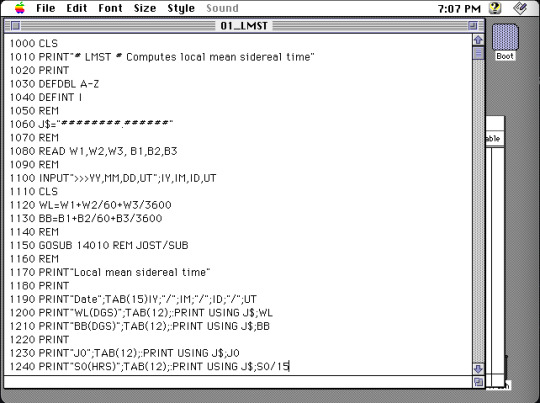
You could simply port all the scripts to another BASIC, but at that point you might as well just port them to another langauge entirely, a modern language.
Except QuickBasic had some funky data types. And the scripts assume a 16-bit integer, taking advantage of the foibles of bitfutzery before converting numbers into decimal format. BASIC is very particular -- as many old languages are -- about whitespace.
In addition to all this, BASIC programs are not structured as modern programs. It's structured to be written in ed, one line at a time, typing in a numbered index followed by the command. There are no scopes. There are no lifetimes. It's just a loose collection of lines that are hopefully in a logical order.
So sure, I could port all these programs. But I'm sure to make mistakes.
Wouldn't it just be easier, some basal part of my brain says, to write your own language that some some modern ameneties, that you compile for your own laptop, that kind of acts like BASIC? A language where you just have to translate particular grammar, and not the whole structure of the program?
Of course it's not easier. But I'm already too far in to quit now.
Memory
Who doesn't love manual memory layout?
In QuickBasic, memory is "kind of" manual. The DEFINT and DEFDBL keywords let you magically instantiate types based on their first letter. I don't know how you deallocate things, because all the scripts in this book finish quickly and don't hang around to leak a lot.
In QuickBasic, this looks like

I guess that the second statement just overrides the first.
There is no stack in a BASIC program, so there will be no stack in my language. Instead you just give names to locations.

creates a symbol named age and makes it refer to 0x1F. The pointer operator should be obvious, and the walrus means we're defining a symbol (to be replaced like a macro), not doing a value assignment during the execution of the program. Now we can assign a value.
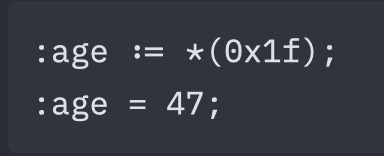
Atoms infer types. age knows it's an int.
You cannot assign a new type to an atom.
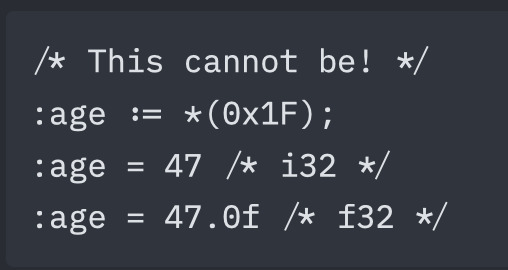
However, you can cast between types by creating two atoms at the same address, typed differently.
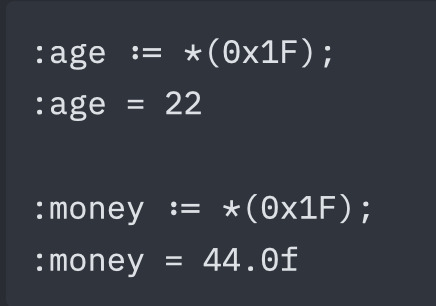
The language does not convert these, it simply interprets the bits as the type demands.
Larger types
Not all types are a single word. Therefore, you can use the range operator .. to refer to a range of addresses.

Note that strings are stored with an extra byte for its length, instead of null-terminating it. Assignment of a string that is too long will result in a compilation error.
Next and Auto
There are also two keywords to make the layout of memory easier. The first is :next which will place the span in the next available contiguous location that is large enough to hold the size required. The second is :auto. For all :auto instances, the compiler will collect all these and attempt to place them in an intelligent free location. :auto prefers to align large structs with 64-word blocks, and fills in smaller blocks near other variables that are used in the same code blocks.
String Allocation
Strings come with a macro to help automatically build out the space required:

This is equivalent to:

That is, a string with capacity 5, a current size of 0, and zeroes (null char) in all spots. This helps avoid memory reuse attacks. ZBASIC is not a secure language, but this is still good practice.
There is also another macro that is similar to a "string literal".

Verbose and annoying! Just like BASIC.
Array Allocation
Likewise, arrays have a similar macro:

Which expands in a similar way as strings, with a capacity word and size word. The difference here is that the type given may change the actual size of the allocation. Giving a type that is larger than a single word will result in a larger array. For instance, f64 takes up two words some systems, so array::empty!(5, f64) will allocate 10 words in that case (5 * 2). Larger structs will likewise take up even more space. Again, all this memory will be zeroed out.
Allocation order
As an overview, this is the order that memory is assigned during compilation:
Manual Locations -> Next -> Auto
Manual locations are disqualified from eligibility for the Next and Auto phases, so a manual location will never accidentally reference any data allocated through :next or :auto.
Here is an example:
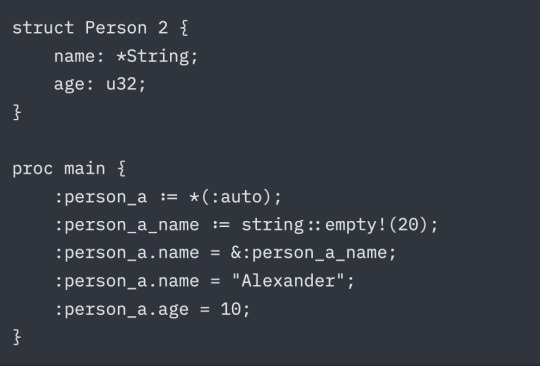
This produces the initial layout:

Which, after the code is run, results in the memory values:

Note that types are not preserved at runtime. They are displayed in the table as they are for convenience. When you use commands like "print" that operate differently on different types, they will be replaced with one of several instructions that interpret that memory as the type it was at compile-time.
Truly awful, isn't it?
3 notes
·
View notes
Text
Episode 7 My thoughts 💭
Riiiight, death match time!
I'm a bit slow. So all the leaders should pick a better rapper in order to survive? And if they want to get rid of a shitty rapper, they should pick someone worse than themselves? That is what I'm hearing.
WAIT I'm confused. I'll just shut up and watch. OH it depends on how well you did at the Block Tournament. That makes sense.
Khan isn't planning on sacrificing Loopy meanwhile Loopy would sacrifice himself for his team every time lol
Reddy is also saving Haon basically.
Kaogaii what are you doing???? Is his father's instincts kicking in???
CHABOOM WHAT ARE YOU DOING
WHY WOULD YOU PICK MARV AND NOT DOUBLE DOWN
Goodbye Gamma
Cocona and two guys who never performed
Block 1 and Block 5 didn't pick any elimination candidates because they survived everything in the previous episode.
DAMN only 8 out of 16 will survive!
WHAT
Oh I get it now
So the leaders will have a 1 on 1 battle. Before they begin, they have to submit a card with the name of one of the elimination candidates. So if Hippie Kunda for example wins and she picked Gamma, Gamma will survive.
~
Hello everyone, OP here. From this moment until 1 hour 1 minute of the show, I forgot to save my writing on my phone. I have no one to blame but myself. Should I start over again and re-watch the past 40 minutes?
I have decided to continue watching like nothing happened. I'll finish the episode as usual but afterwards I'll think again about what to do. After all, there is still 1,5 hour left... I'll change to my laptop because auto-save TT
OP again. I'll just skip this part. I even forgot to upload this T^T
~
Alright Hippie Kunda vs Kaogaii. O'Domar survives and the rapper who goes home is- what the fuck? Gamma? I had a gut feeling. I hope next time he goes on a show, he'll do better.
Last battle! Kaogaii should go again, right? I'm confused, what is this show trying to foreshadow? I applauded behind my screen for Hippie Kunda, it must suck for her because she just lost. I'm proud of her for working hard! Oh! Instead of giving a shitty performance, he didn't rap at all. He was planning on eliminating Koala. I think it's Koala because he's the one who's edited out. I forgot about him lmao. Thanks to the K-hiphop sub-reddit for proving information!
So everyone tried their best to save their teammates, only Kaogaii used this opportunity to eliminate a rapper on purpose.
Loopy, Reddy and Haon... their hearts are too big for their bodies.
What will happen to Block 7? Will there be drama? Reddy showed a more confident performance than Chaboom both times. It is what it is. Owen in Block 5? Will they accept him? Either way, if Owen wants to win then, yes I agree that staying in Block 7 is a bad idea. Something has to change.
Block 8 is just 3 people now. They should make a big change to in order to survive. Ahw, I want to give all of them a hug :((
Jack Daniel's ad time
Owen looks like a tomato hahaha
Loopy and Owen... It was very touching to watch. I have been avoiding this but ever since the two of them were announced to participate, I was hoping for a mkit rain reunion. I didn't express it, worried I'd jinx it or something. I feel so nostalgic right now, it's unbelievable, I discovered them 5 years ago...
Oh shit. Daniel Jikal decided to withdraw from the show. I respect his decision.
Khundi Panda is now leader of Block 5. Not gonna lie, I thought he was already the leader, not JP. I forgot. Owen and DD join Block 5!
lmao Kaogaii tried to recruit Since and now Since is trying to recruit Kaogaii.
Kaogaii is so entertaining XD
SINCE IS GOING TO BLOCK 6?? Wow I thought she was a loyal person but it seems like she values winning more. I don't mind, the longer she survives, the more I get to watch her perform. I do hope that outside of Rap:Pulic, Since and Punchnello drop a song together. I really enjoy the two of them on stage. Block 6 is looking stronger. Skyminhyuk is now the leader of Block 4, instead of Punchnello. Hippie K and Drain K join Block 4 and Block 8 dissolves.
JTong is joining Block 2!! Even though he left, Block 1 is still a strong block. Chaboom is moving to Block 3. Foggyatthebottom moves to Block 2 and just like that, Block 7 closes down. Double Down changes teams again is now in Block 1. Osun is joining Block 5. Where did that come from? Damn, he gets to be the leader too. Nice deal. Oh Osun~ you broke Haon's heart :( Kind of a dick move to change blocks without saying anything.
~
It is time for a new mission. Changing Blocks has come to an end. Third Block Match. Block competition. First match, Block 5 vs 4. Second match, Block 3 vs 6. Third match, Block 1 vs 2. Oh shit we're already starting the fight! The preview for the next episode looks promising, it'll be lots of fun!
4 notes
·
View notes
Text
Dangerous Romance Episode 1
The newest GMMTV Thai BL has dropped and starring Perth X Chimon, this enemies to lovers trope is set in high school. And so far, I’m liking it.
The first episode highlights the societal, economic and class differences between our 2 main characters (and their group of friends).
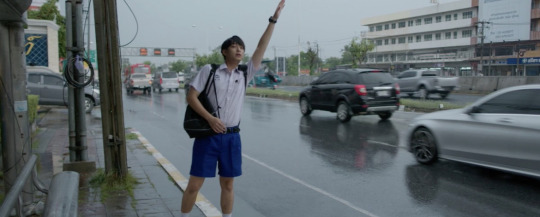
We open with Sailom, played by the ever talented Chimon working hard in his part time job, while still maintaining his scholarship attending what appears to be quite a prestigious school (with a lot of the children being sent in expensive looking cars!) - and despite the financial hardship, you can see the cheeky side of Sailom (the way he answered the customer from the car wash shop 😂😂😂). I also love the small details (like how worn out his school shirt is compared to his schoolmates), again highlighting his financial situation. He has 2 loyal friends - both also on scholarships - Auto (Euro Thanaset) who is obsessed with an idol girl group, his mother working in the school canteen means he is always ready to feed Sailom when the latter is short of money. Then we have Guy (Marc Pahun!! So glad you are back on screen!), likely on a football scholarship? - alway ready to back up his friends.
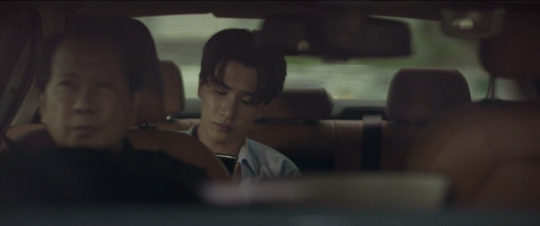


Contrast with Kanghan, rich and unfortunately a bully. Clearly used to getting his own way, and being the top dog in school (anyone reminded of the F4 series?). He has the teachers wrapped around his fingers and nobody in school dares to go against him. But you can also see he has a soft spot for his grandma and Pimfah (beautiful View!!!! So glad to see her again!). And while his cronies (Max played by JJ, Nawa played by Pawin) shipped them together - Kanghan and Pimfah appears more to be close childhood friends who understand each other (I may of course be proven wrong as the series progress!)
Conflict arises when Auto got tangled up with Kanghan gang by agreeing to help them do a group project for money, but the plan went pear-shaped with Auto ultimately being beaten up. And that’s when the tug and war start between Sailom and Kanghan.
While Sailom tried to do the right thing by reporting the bullying, their homeschool teacher is not buying it (also Kanghan definitely has the teachers wrapped around his fingers) - “it’s just boys playing around. Now apologise and make up with Kanghan.”
It’s start a petty war from Kanghan’s side - throwing water/a shoe to Sailom, cutting up his bag/homeworks and harassing him at his side job
But, Sailom gives back just as good - he has some of the best line in this episode 😂😂😂

“Do you want to be a hero?” Kanghan
“Why, do you want to be my heroine?” Sailom


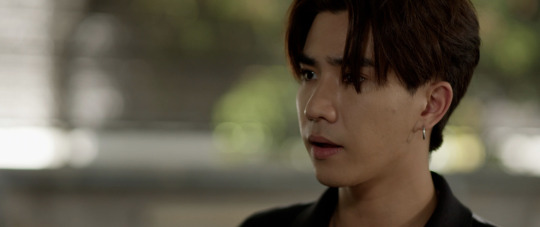
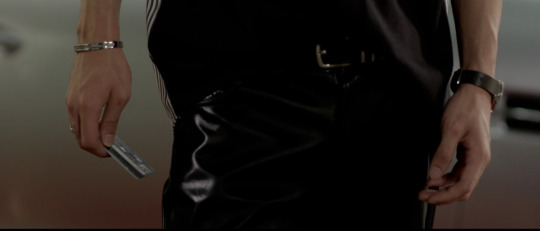
“There’s 2 type of people, the car owner and the car washers.” Kanghan (while slyly putting a credit card in Sailom’s pocket to get him in trouble) before Sailom slyly putting it back in the former pocket “There’s 2 type of people, a smart one and the person thinking he is smart.” Sailom
The episode ended with Auto being used to lure Sailom for essentially a beat up session in front of everyone (While Guy being locked up to stop him from interfering).
And again, despite Kanghan trying to humiliate Sailom by declaring he will forgive everything if Sailom kisses Auto - Sailom flipped the narrative and kissed Kanghan in front of the crowd (🤌👏👏👏) - now that’s a genius move by Sailom (or it could idiotic but we’ll see in next week episode 🫣)
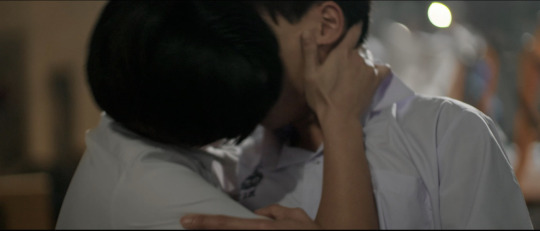
The first round of Sailom vs Kanghan goes to Sailom. He is smart, sassy and not phased by Kanghan and his groupies. Yes, it’s frustrating and troublesome, but Sailom knows the value of patience. He is also aware of his lower socioeconomic status - and how to circumvent around it. Whether or not he will remain patience as Kanghan intensify his attacks (or if the trailer is to believed when loan sharks comes knocking and his brother get into trouble) will be interesting to see.
Kanghan despite being a bully clearly has a soft spot for his family and close friends. And there seems to be a barrier with his father - on the surface his father seems encouraging but also not?- “I want you to concentrate in school, have fun and hang out with your friends. Don’t need to do run for school president, it’s not fun etc etc.”
You can see his face fell when he heard his dad say the above (also, this is the first time I heard an Asian parent not wanting their children to strive for the best 😂😅) - so, I’m not that surprised why Kanghan just go on with his days cruising, as there is no expectations from his dad..and he seems at loss what to do with his future.
Will be interesting to see how their relationship unfolds as the series progresses!!!
18/08/2023
#dangerous romance the series#episode 1#kanghansailom#perth tanapon#chimon wachirawit#perthchimon#marc pahun#pawin kulkaranyawich#jj chayakorn#view benyapa#euro thanaset#gmmtv series#thai bl
36 notes
·
View notes
Text
Review: Stream (2024)
Stream (2024)
Not rated
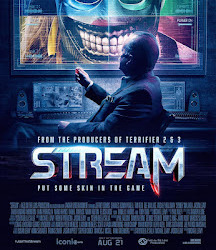
<Originally posted at https://kevinsreviewcatalogue.blogspot.com/2024/10/review-stream-2024.html>
Score: 2 out of 5
Stream is a fairly forgettable, ho-hum movie, but one that would've made for a great video game. Specifically, it would've been a great modern-day remake of Manhunt, the classic and infamous 2003 survival horror game by Rockstar Games, the makers of the Grand Theft Auto series, in which you play as a death row inmate who is spared execution only to be forced into a snuff film operation. That, or it would've made for a great asymmetric multiplayer horror game in the mold of Dead by Daylight in which multiple people play as both the killers and their victims, with the former side scoring points by killing and the latter side doing so by surviving and escaping. It's rather appropriate, too, given that the film's basic premise concerns a shadowy criminal organization that has trapped a bunch of ordinary vacationers in a hotel to be hunted down by a group of masked slashers, the entire thing filmed and livestreamed for the enjoyment of sickos around the world. Not only is this quite similar to the plot of Manhunt, it also revolves heavily around the world of online streaming, something that is now part and parcel of video game culture, including one major character being an adolescent boy who streams himself playing video games.
And yet, despite this simple but golden premise, solid production values, sweet kills, cool killers, and Jeffrey Combs hamming it up as the villain, it just ultimately didn't come together as a good movie. The problems all came down to the story, which was overlong, took half the movie to get going, was so paper-thin with its satire of streaming that I can barely call it half-hearted in that regard, and was filled with throwaway characters who contributed nothing, existed only to die in creative ways, and had me muttering the Eight Deadly Words -- "I don't care what happens to these people" -- by the halfway point. This is a movie that people only paid any attention to in the first place because it was produced by Damien Leone and the rest of his crew from the Terrifier films, even though his creative involvement was limited to the admittedly cool special effects work. The best comparison I can think of is to the first film in The Purge series, a movie that had a very interesting premise that turned out to be ripe for a franchise but unfortunately blew the execution on the first go-around. I'd love to see a sequel that fixes all the problems that this film has, but I can't recommend it on its own merits.
Of the many characters we get among the people being hunted for sport, the only ones who get any focus beyond just serving as more bodies for the pile are the Keenan family, who serve as our protagonists, and Dave Burham, an older gentleman who turns out to be a detective investigating the people behind the carnage. Traveling through on their way to an amusement park, the Keenans consist of the father Roy, the mother Elaine, the rebellious teenage daughter Taylor, and the adolescent streamer son Kevin, and to be honest, I couldn't bring myself to care about any of them. Roy is a fairly flat hero, Kevin is little more than a prop, Elaine exists only to add another entry to the list of characters Danielle Harris has played in horror movies who get killed off brutally, and Taylor's motivations switch on a dime, at one point hating her parents and running away with a French guy she met at the hotel only to get cold feet and a sudden pang of "but I still love my family!" for no reason except to justify her returning to the film (and to create suspicion around the French guy that goes nowhere). As for Burham, he's blatantly telegraphed as a guy with a hidden agenda so early on that the big twist that he's actually part of the game not only wasn't a surprise, it ruined the film's attempts to create suspicion around the other people in the hotel. The actors were all acceptable, but they were saddled with such worthless nothing characters that their efforts were wasted.
What's more, the film asks me to spend an hour with these worthless nothings before it actually gets to the goods. I get what this movie was trying to go for here, focusing on the victims so that we care more about them once they start dropping. This was, after all, produced by the guys behind Terrifier, a series that only really came to life when the second film paired its memorable villain up with an equally memorable heroine to fight him. The thing is, Sienna Shaw was a legitimately great character in her own right, and the Keenans are not Sienna Shaw. They're depicted in the first half as a cliché of a suburban family that hates each other, and in the second half as bumbling idiots barring the brief moments when they get sudden, inexplicable bursts of hyper-competence (like, how did Roy know to take that opportunity presented by one of the hidden cameras being busted?). The movie was too dumb for too long to get me to care about its protagonists, which would've been acceptable had this movie gone for the requisite "twenty minutes with jerks" that horror movies usually use to give us the lay of the land before the mayhem starts, but not when its failed attempts at character development take up half the movie.
Where this film came alive was when it focused on the other half of the equation, the killers and the mysterious organization that's responsible for everything. Jeffrey Combs was clearly enjoying himself as Mr. Lockwood, the man who runs the whole operation and is clearly getting into it, at first posing as the hotel's owner to the guests before showing his true colors halfway in. A number of scenes in the first half revolved around Lockwood and his band of killers taking out the hotel's staff, rigging the place up for their murder spree, and facing a number of unforeseen problems that they have to work around, like one employee calling in sick and somebody else showing up in his place, or a drunken guest accidentally breaking one of their cameras. The killers themselves don't get to do much beyond wear cool masks and hack people up, but that is precisely what they do, and it is awesome. Each killer, identified only by a number, has a unique look, with Player 1 being a modern "hoodie" slasher, Player 2 channeling a lot of Art the Clown in his theatrics and body language (fitting, since he's played by David Howard Thornton under the mask), Player 3 being the token woman among them as a hot chick with a sadistic streak and a similar theatricality to 2 (who's shown to be her brother), and Player 4 being a hulking brute reminiscent of Jason Voorhees. The idea of a bunch of killers running around in a competition with each other, like a sick version of American Gladiators, was this film's big twist on the slasher formula, and it served as justification for a bunch of bloody and creative kills, the highlight being when Players 2 and 3 play a game of tic-tac-toe with a knife on some poor sucker's torso. They're winning extra points for style, you see, so simple stabbings just won't do. This movie should've focused on them, with the victims as merely supporting characters and minor antagonists, since the things it teased about the inner workings of this organization were far more interesting than the boring stories of the people they were hunting. The ending teased a whole ton of sequel ideas, as well as Tony Todd as another ringleader for this blood-soaked circus, all ideas that I think would've made a far better movie than the one we got.
The Bottom Line
Stream is a movie that doesn't know what its best qualities are. Instead of focusing on its cool killers and made-for-a-video-game concept, it spent way too long focusing on protagonists who were as dull as dishwater and who I couldn't wait to see meet their ends just to get them out of my face.
#stream#2024#2024 movies#horror#horror movies#slasher#slasher movies#damien leone#david howard thornton#danielle harris#jeffrey combs#dee wallace#daniel roebuck#tony todd#felissa rose
4 notes
·
View notes
Text
Best Practices for Successful Automation Testing Implementation

Automation testing is an essential part of modern-day software development that accelerates delivery, reduces manual work, and improves software quality. But success in automation testing is not assured, it should be achieved by proper planning and execution along with proper compliance of best practices.
In this blog, we will talk about key actionable strategies and best practices to ensure the successful implementation of automation testing in your projects.
1. Start with a Clear Strategy
Jumping straight into automation testing without a clear strategy will not always yield the desired results. Define the following:
Objectives: Define the goals of the automation, whether it is about shorter test cycles, improved test coverage or eliminating human error.
Scope: Set the areas of your application for automation and focus much on areas that have a high impact like regression and functional testing.
Stakeholders: Get early involvement from the development, QA and product teams to avoid misalignment regarding expectations.
A well-formed strategy helps guide the way and make sure everyone involved is aligned.
2. Prioritize the Right Test Cases for Automation
One of automation testing’s biggest mistakes with it is to use automation for everything. Rather than that, shape your test cases to that of:
Are monotonous and time-consuming.
Wherein critical for application functionality
Have stable requirements.
Some of these tests are regression tests, smoke tests, data-driven tests, etc. Do not automate the exploratory or highly dynamic tests that often get changed.
3. Choose the Right Automation Tools
The effectiveness of your automation testing initiative highly relies on appropriate tools selection. Look for tools that:
Support the technology stack of your application (e.g., web, mobile, APIs).
Give the flexibility to expand your project.
Offer extensive reporting, reusability of scripts, and run across browsers.
GhostQA is one example of a codeless platform that works well for teams across the skill set. GhostQA can let you focus on what matters and Auto Healing reduces your maintenance to enforce.
4. Build a Strong Automation Framework
An automation framework is the backbone of your automation testing process. It helps in standardization, reusability and scalability of test scripts. So, when you start designing your framework, make sure to leave some room for these features:
Modularity: Split test scripts into reusable components
Data-Driven Testing: Use Data-Driven Testing to separate test data from the scripts to provide flexibility.
Error Handling: Install anti-malware solutions to prevent potential threats.
A good framework streamlines collaboration and makes it easier to maintain your tests.
5. Write High-Quality Test Scripts
A good test script decides the reliability of your automation testing. To ensure script quality:
When naming scripts, variables, or methods, use meaningful and descriptive names.
For adaptability, you should leverage parameterization instead of hardcoding these values.
Set up appropriate error-handling procedures for handling unforeseen problems.
Do not add anything unnecessarily, the more complexity, the more difficult it is to debug and maintain.
Tools such as GhostQA minimize the efforts put behind scripting providing no-code possibilities allowing even non-technical users to write robust tests.
6. Regularly Maintain Your Automation Suite
Even though automation testing is a great way to ensure quality in applications, one of its biggest challenges is keeping the test scripts updated with application changes. Keeping your test suite effective and up to date, regular maintenance.
Best practices for maintenance include:
Frequent Reviews: Conduct periodic audit of the test scripts to ensure that they are not outdated.
Version Control: Utilize version control systems to maintain history of your script modifications.
Auto-Healing Features: GhostQA and similar tools can track UI updates and modify scripts to reflect changes with little to no human intervention, minimizing maintenance costs.
Take good care of your automation suite so that it doesn't become a liability.
7. Address Flaky Tests
Flaky tests—tests that pass or fail randomly—are a common issue in automation testing. They reduce trust in test results and take up time when debugging. To address flaky tests:
Dig deeper into what might be the underlying causes — timing problems or dynamic elements.
Use explicit waits instead of static waiting in tests to make them aligned with application behavior.
Prefer smart detection-based tools (GhostQA, to be precise) to eliminate the chances of flaky tests.
This translates into flourish as flakiness and is the most significant impact in strengthening confidence in your automation framework.
8. Ensure Cross-Browser and Cross-Platform Compatibility
Most modern applications work across many browsers and devices, so cross-compatibility testing is a necessity. Your automation testing suite must:
Add test cases for popular browsers like Chrome, Firefox, Edge, and Safari.
Testing across different operating systems on mobile (e.g., iOS/Android).
GhostQA abstracts cross-browser and cross-platform testing so you can verify functionality in several types of environments without repeating yourself.
9. Leverage AI and Smart Automation
AI is revolutionizing automation testing with better efficiency and lesser maintenance cost. Next-generation tools like GhostQA powered by AI offer:
Auto-Healing: Automatically adjust to any changes made to the app;such as modified UI elements
Predictive Analysis: Showcase areas with the most potential high risk to prioritize tests.
Optimized Execution: Run just the tests that yield the most performance insights.
Use AI-Powered Tools as these can help you to increase the efficiency and accuracy of your testing.
10. Monitor and Measure Performance
To measure the effectiveness of your automation testing, you should track key metrics that include:
Test Coverage: Number of automated tests covering application features.
Execution Time: Time taken to execute automated test suites.
Defect Detection Rate: Number of bugs detected in automation testing
Flaky Test Rate: Frequency of inconsistent test results.
Consistent assessment of these metrics helps in discovering the areas of improvement in your automation efforts while also exhibiting the ROI of the same.
Conclusion
So, the right approach of selecting the right tool and plan properly will help to do a successful automation testing implementation. This could be achieved by adopting best practices like prioritizing test cases, maintaining test scripts, making use of the AI-powered tools and collaborating with other stakeholders in the process.
Tools like GhostQA, which come equipped with codeless testing, auto-healing features, and user-friendly interfaces, empower teams of both technical and non-technical backgrounds to streamline their automation processes and devote their attention to shipping quality software.
#automation testing#software testing#test automation#functional testing#automation tools#quality assurance
2 notes
·
View notes